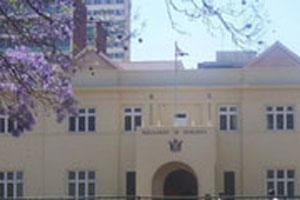
We would have wanted to start this column on another subject, but what is happening in the judiciary is irresistible.
Dzikamai Bere & Prosper Maguchu
To those who missed the stories, the Judicial Service Commission (JSC) is carrying out interviews in order to fill the positions for Supreme Court Judges in line with provisions of the new constitution.
Section 180 of the new Constitution requires the JSC to conduct public interviews of prospective candidates to the office of a judge.
We have to applaud the JSC for making a reality this provision which enhances transparency. What is important to us are not the juicy aspects of the judges’ private life, but rather the important role of the judiciary in a society like Zimbabwe.
Zimbabwe is struggling to make a clean break with violence. The judiciary cannot be told about this legacy. They have handed down thousands of judgments against perpetrators of political violence. They have recorded chilling testimonies. They know the violence.
In fact, the judiciary has been a victim. Readers will remember the unfortunate incident on November 24 2000 when the war veterans, led by the now Honourable MP Joseph Chinotimba, invaded the Supreme Court and demanded the departure of the then Chief Justice Anthony Gubbay shouting “kill the judges”. The judiciary bowed to political pressure. The Chief Justice and some of the leading legal minds left the bench, paving way for a “liberated bench” as one of the ministers later said.
We believe this history was not hidden from those who designed in our constitution the procedure for appointing and firing of judges. The process can be humiliating as some of the judges learnt during the interviews.
- Chamisa under fire over US$120K donation
- Mavhunga puts DeMbare into Chibuku quarterfinals
- Pension funds bet on Cabora Bassa oilfields
- Councils defy govt fire tender directive
Keep Reading
l To build the integrity of the system, we have to question the integrity of some of its members.
It’s the acceptable burden of justice for a system trying to cleanse itself of the scum of the past. We wish to point out that what has always been on trial in Zimbabwe is not the individual integrity of office bearers, but rather the integrity of the entire system. It is not just about the judges cheating on their wives; that is a civil matter.
The main issue for us is about the judiciary cheating the people of Zimbabwe, sleeping with the perpetrator while survivors continue to perish and justice is deliberately denied. In the end, we now have a weak judiciary open to manipulation and seduction by the political elite.
There is need to build a strong, independent and dependable judiciary capable of protecting the rights of all people. To do so, requires not just a new procedure of doing the same things with the same people. We need to introduce serious structural reforms that create a new culture and new norms.
We need a judiciary that is not stuck timidly in the past but one that is present to the present needs of the people of today. This can be achieved through a more comprehensive transformation programme. In this article we will identify three key things, which this programme might include.
A new philosophy Corruption in the judiciary has become a deep culture. There is need for the development of a new judicial philosophy to transform a deep culture of corruption and power abuse.
This will mean revisiting the curriculum in the universities and an increased thrust on the transformative role of justice in our society. When you see a person being appointed a judge and the first thing that comes to their mind is “when do I get a farm?”, it means there is something fundamentally wrong in the philosophy that is shaping the people we are trusting with justice.
Depoliticisation As Chief Justice Godfrey Chidyausiku sat on that interviewing panel, scrutinising the infidelity of others, we who are students of history struggled to forget that he came to the throne at the time when the war veterans declared war on Justice Gubbay.
Can we forget his relationship with a political movement that has caused the suffering of many people? We doubt it. He represents that legacy which the judiciary must deal with. Justice must not only be done, but it must be seen to be done.
Public confidence in the judiciary will never be restored until key persons associated with organisations involved in gross violation of human rights cease to pretend to be the face of justice and pave way for genuine reforms. And yes, here we are talking of lustration and vetting for judicial officers, right from the top. This is a difficult process, which the judiciary cannot avoid.
Legal Training The judiciary will benefit from innovative continued legal training programmes that tackle new legal challenges. A snap survey of law schools in the region will reveal that our legal education is lagging behind. Training in critical areas like Transitional Justice, Minority Rights Protection and Conflict Transformation which are part of the evolving legal knowledge world-wide seem like forbidden subjects in Zimbabwe.
While the Law Society can only do so much with its legal clinics, there is need for the Council for Legal Education and the respective faculties to develop world class training programmes in harmony with new challenges to ensure that judicial officers remain competent even to serve in international bodies.
In the next installment we expand the list and look at what stands in the way of an effective transformation programme for the judiciary.
Dzikamai Bere & Prosper Maguchu are both human rights defenders and transitional justice practitioners associated with a local human rights group. They contribute to this column in their personal capacities. The views here are not the views of the organisations they are associated with.











